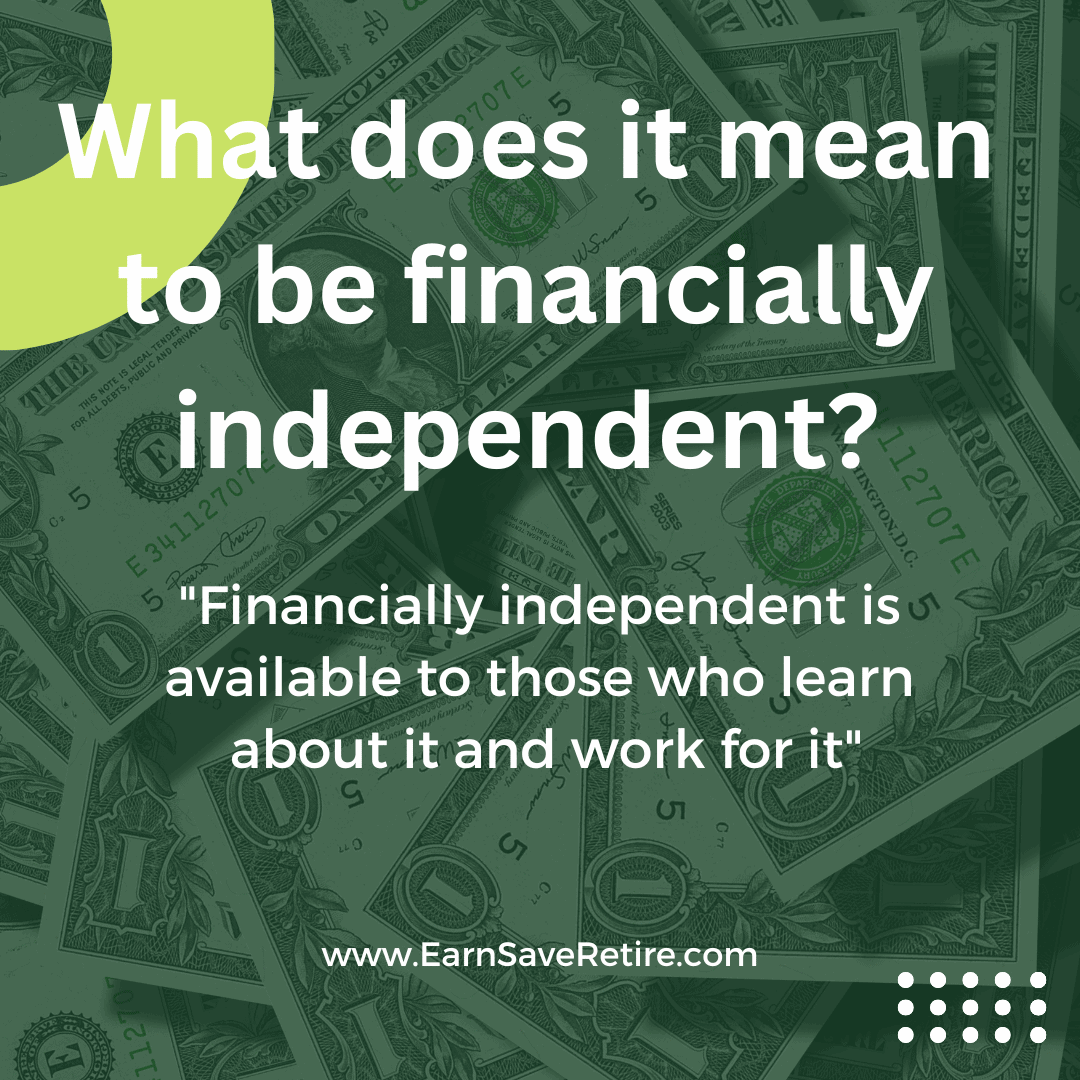What does it mean to be financially independent?
Welcome to the world of financial independence, where the pursuit of freedom takes on a monetary twist. But what does it truly mean to be financially independent? It’s not just about having a hefty bank account, but rather the ability to live life on your own terms, without being shackled by money worries.
In this article, we will unlock the secrets to financial independence and explore its various dimensions. From building a solid financial foundation to generating passive income streams, we will delve into the strategies and mindset required to achieve this coveted state.
Whether you dream of retiring early, starting your own business, or simply gaining the freedom to pursue your passions, understanding the concept of financial independence is essential. We will discuss how to eliminate debt, maximize savings, and invest wisely to create a sustainable financial future.
Join us on this journey as we explore the pathways to financial independence, empowering you with knowledge and actionable steps to take control of your financial destiny. Get ready to unlock the secrets and embark on a life of financial freedom.
Defining Financial Independence
Financial independence is a state of being where an individual or household has accumulated sufficient wealth or passive income to cover their living expenses without the need for traditional employment. It’s a highly coveted goal for many people, as it provides the freedom to live life on their own terms, pursue their passions, and make decisions without the constraints of financial worries.
At its core, financial independence means having the ability to choose how you spend your time and resources. It’s not just about having a large bank account or a high net worth; it’s about having the financial security and flexibility to live the life you desire. When you achieve financial independence, you are no longer beholden to a paycheck or a job, but rather, you have the power to dictate your own path.
The concept of financial independence can take on different forms for different people. For some, it may mean the ability to retire early and travel the world. For others, it could be the freedom to start a new business or pursue a creative passion without worrying about making ends meet. Regardless of the specific definition, the underlying goal is the same: to gain control over your financial future and live a life of purpose and fulfillment.
The Importance of Financial Independence
In today’s fast-paced and ever-changing world, the importance of financial independence cannot be overstated. It provides a sense of security, stability, and freedom that can have a profound impact on an individual’s overall well-being and quality of life.
What does it mean to be financially independent?
One of the primary benefits of financial independence is the ability to make decisions without the constraints of financial concerns. When you are not beholden to a paycheck or a job, you can pursue your passions, take calculated risks, and explore new opportunities without the fear of jeopardizing your financial stability. This can lead to a greater sense of fulfillment, as you are able to align your actions with your values and personal goals.
Moreover, financial independence can provide a buffer against unexpected life events, such as job loss, medical emergencies, or economic downturns. By having a solid financial foundation and the ability to generate passive income, you can weather these storms with greater resilience and peace of mind. This can alleviate the stress and anxiety that often come with financial insecurity, allowing you to focus on the things that truly matter to you.

Building a Strong Foundation for Financial Independence
Achieving financial independence is not an overnight process; it requires a strategic and disciplined approach over an extended period. The foundation for financial independence is built upon a series of fundamental steps that, when executed consistently, can lead to a secure and sustainable financial future.
The first step in this journey is to establish a clear understanding of your current financial situation. This involves taking a deep dive into your income, expenses, assets, and liabilities. By gaining a comprehensive understanding of your financial landscape, you can identify areas for improvement and develop a targeted plan to address them.
With a solid grasp of your financial reality, the next step is to create a realistic budget that aligns with your long-term goals. This budget should account for all your essential expenses, as well as allocations for savings, investments, and discretionary spending. By maintaining a disciplined approach to budgeting, you can ensure that your spending is aligned with your financial priorities and that you are consistently making progress towards your goals.
Steps to Achieve Financial Independence
Achieving financial independence is a journey that requires a multifaceted approach. While the specific steps may vary depending on your individual circumstances, there are several key strategies that can help you navigate the path to financial freedom.
One of the most fundamental steps is to develop a savings mindset. This means prioritizing the allocation of a significant portion of your income towards savings and investments, rather than immediate consumption. By consistently saving a substantial portion of your earnings, you can gradually build up a robust financial cushion that can serve as a foundation for your future investments and passive income streams.
Another crucial step is to diversify your income sources. Relying solely on a single paycheck can make you vulnerable to economic fluctuations or job instability. By exploring alternative income streams, such as side hustles, rental properties, or dividend-paying investments, you can create a more resilient and sustainable financial ecosystem. This diversification not only provides additional sources of income but also reduces your overall risk exposure.
Creating a Budget and Managing Expenses
Crafting a detailed and realistic budget is a critical component of the journey towards financial independence. By meticulously tracking your income and expenses, you can gain a clear understanding of your spending patterns and identify areas where you can optimize your cash flow.
Begin by categorizing your expenses into essential (rent, utilities, food) and discretionary (entertainment, travel, dining out) categories. This will help you identify areas where you can potentially cut back or find more cost-effective alternatives. It’s important to be honest and thorough in this process, as any blind spots or underestimations can undermine your financial progress.
Once you have a comprehensive understanding of your spending habits, focus on implementing strategies to reduce unnecessary expenses. This may involve negotiating better rates on recurring bills, finding ways to cut back on discretionary spending, or exploring more cost-effective alternatives for essential goods and services. By implementing these strategies, you can free up more funds to allocate towards your savings and investment goals.
Saving and Investing for the Future
Saving and investing are the cornerstones of financial independence. By consistently allocating a portion of your income towards these activities, you can steadily build your wealth and create a secure financial foundation for the future.
When it comes to saving, the key is to adopt a disciplined approach. This may involve automating your savings, setting specific savings targets, or even opening dedicated savings accounts for different financial goals. By making saving a non-negotiable part of your monthly budget, you can ensure that your wealth-building efforts are not overshadowed by day-to-day expenses.
As for investing, it’s important to develop a well-diversified portfolio that aligns with your risk tolerance and long-term financial objectives. This may include a combination of low-cost index funds, dividend-paying stocks, real estate investments, and other asset classes that can provide steady returns over time. By taking a long-term, disciplined approach to investing, you can harness the power of compound growth and create a robust foundation for your financial independence.
Building Multiple Streams of Income
While saving and investing are essential components of the financial independence equation, diversifying your income sources can be a powerful strategy to accelerate your progress. By building multiple streams of income, you can reduce your reliance on a single paycheck and create a more resilient financial ecosystem.
One approach to building multiple income streams is to explore passive income opportunities, such as rental properties, dividend-paying investments, or online businesses. These income sources can provide a steady flow of cash without requiring a significant time commitment, allowing you to focus on other areas of your life.
Another strategy is to develop side hustles or freelance opportunities that leverage your skills and expertise. Whether it’s consulting, freelance writing, or a specialized service, these supplemental income streams can contribute to your overall financial well-being and provide a cushion against unexpected events.

Eliminating Debt and Managing Credit
Debt can be a significant barrier to achieving financial independence, as it can consume a substantial portion of your income and limit your ability to save and invest. Therefore, a crucial step in the journey towards financial freedom is to prioritize the elimination of debt, particularly high-interest consumer debt.
Begin by creating a debt repayment plan that focuses on tackling your highest-interest debts first. This may involve consolidating multiple debts into a single, lower-interest loan or negotiating with creditors for better terms. By aggressively paying down your debt, you can free up more of your income to allocate towards savings and investments.
Alongside debt elimination, it’s essential to develop healthy credit habits. This includes maintaining a low credit utilization ratio, making payments on time, and monitoring your credit report regularly. By demonstrating responsible credit management, you can not only improve your credit score but also enhance your ability to access favorable financing options in the future, such as mortgages or business loans.
Planning for Retirement and Long-Term Financial Goals
Achieving financial independence is not just about the present; it’s also about securing a stable and fulfilling future. As you work towards your immediate financial goals, it’s crucial to have a well-defined plan for your long-term financial aspirations, particularly when it comes to retirement.
One of the key elements of this plan is to maximize your retirement savings, whether through employer-sponsored plans, individual retirement accounts (IRAs), or other investment vehicles. By consistently contributing to these accounts and taking advantage of tax-advantaged opportunities, you can build a sizable nest egg that can provide a reliable income stream in your golden years.
In addition to retirement planning, it’s essential to consider other long-term financial goals, such as funding your children’s education, purchasing a home, or supporting charitable causes. By integrating these objectives into your overall financial strategy, you can ensure that your journey towards financial independence is aligned with your values and personal aspirations.
Conclusion: What does it mean to be financially independent?
Financial independence is not just a lofty goal; it’s a state of being that can profoundly transform your life, providing you with the freedom to live on your own terms and pursue your passions without the constraints of financial worries.
By defining your financial independence, building a strong foundation, and implementing the strategies outlined in this article, you can embark on a journey towards a secure and fulfilling future. Remember, the path to financial independence is not a sprint, but a marathon – it requires patience, discipline, and a steadfast commitment to your long-term goals.
As you navigate this journey, embrace the challenges and celebrate the small victories along the way. With each step you take, you’ll be one step closer to unlocking the secrets of financial independence and creating the life you truly desire. Embrace this pursuit with passion and determination, and you’ll be well on your way to a future filled with financial freedom and personal fulfillment.
